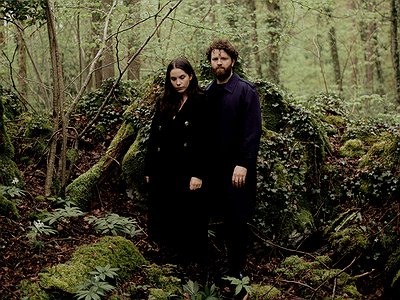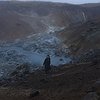Name: Álfheiður Erla Guðmundsdóttir
Nationality: Icelandic
Occupation: Vocalist (soprano), visual artist, composer
Current release: Álfheiður Erla Guðmundsdóttir teams up with Viktor Orri Árnason for Poems, out now via Deutsche Grammophon.
Vocal Music Recommendations: Love Fisherman's Woman by Emiliana Torrini; Bach's Saint Matthew Passion, "Erbarme Dich"
[Read our Viktor Orri Árnason interview]
If you enjoyed this Álfheiður Erla Guðmundsdóttir interview and would like to stay up to date with her music, visit her official website. She is also on Instagram, and Facebook.
Where does the impulse to create something come from for you? What role do often-quoted sources of inspiration like dreams, other forms of art, personal relationships, politics etc play?
Curiosity often sparks my need to create. When I hear an interesting story, or am told of an interesting person, I really enjoy diving deeper in search of coincidences. I love reading about inspiring people in an archive of vintage newspapers we have in Iceland. Old movies, analog photography and even perfume can inspire me!
And of course strong emotions I’ve experienced with others. My childhood surroundings and nostalgia. All this can inspire me in the making of a song, poem or a visual story.
For you to get started, do there need to be concrete ideas – or what some have called a 'visualisation' of the finished work? What does the balance between planning and chance look like for you?
For me - there’s hardly ever a plan. I allow the flow to be natural in the search of something that feels right. Sometimes there’s an empty paper in the process which is perfect for writing in some keywords which helps me visualize what is in the making.
Is there a preparation phase for your process? Do you require your tools to be laid out in a particular way, for example, do you need to do 'research' or create 'early versions'?
For some reason I always dive very deep into research mode before I begin, as if I want to grasp everything around the theme to feel ready to start exploring my own ideas.
Do you think that some of your earliest musical experiences planted a seed for your interest in your voice and singing? How and when did you start singing?
My mother is a music therapist and runs a music school for children with disabilities and my father is a conductor and teacher so there was definitely music all around growing up. I remember taking a lot of space at all dinner parties, performing endless songs and directing all my cousins in homemade operas.
I started taking singing lessons from the age of four in a Suzuki music school in Reykjavík and have been singing ever since. Growing up I watched the same movies again and again and I think they also really had an impact on me. Movies such as My fair lady, The Sound of Music, Fantasia and so on.
Then going to concerts and opera performances really influenced me and I became even more certain that this was something I wanted to do for a living.
Singing is an integral part of all cultures, and traditions. Which of these do you draw from – and why?
Singing is a big part of Icelandic culture and we love singing in choirs. Our traditional folksongs are also sung in schools and we sing them to our babies. Thinking back, I am really thankful for these traditions and how the act of singing is always connected to memorable moments in our lives.
Maybe that has made it even more natural for me to sing and share my emotions with people?
What are the things you hear in a voice when listening to a vocalist? What moves you in the voices of other singers?
Some kind of authenticity or honesty in voices is something I am always drawn to in all various singing styles.
How would you describe the physical sensation of singing? [Where do you feel the voice, do you have a visual sensation/representation, is there a sense of release or tension etc …]
When I sing, I feel warmth and vibrations in my chest and head. I try to always be aware of tension around the larynx or in the jaw.
I try to let the airflow of each tone travel freely up and down the registers while singing the words.
What kind of musical settings and situations do you think are ideal for your own voice?
That is a good question, especially after the release of Poems. As a trained classical singer and as a soprano at a theater, I most often perform in big halls without amplification. I really enjoy the feeling of singing operas or oratorios with an orchestra, but recently I have also realized that I really enjoy going into the opposite direction.
I really enjoyed performing the songs of Poems with Viktor, singing in a microphone, almost whispering the words while he plays the piano. So I guess the answer is: in all kinds of settings and situations!
Álfheiður Erla Guðmundsdóttir Interview Image (c) the artist
From whispers to screams, from different colours to dynamics, what are the potentials and limits of your voice? How much of your vocal performance can and do you want to control?
I am a lyric soprano and sometimes I do enjoy singing coloratura in crazy baroque arias. It is a nice feeling to be able to be in control and sing technically demanding arias, but sometimes it is so liberating to let go and sing lullabies in a more soothing way or the songs of Poems into a very good microphone, picking up all details - and even my heartbeat at times.
Strain is a particularly serious issue for many vocalists. How do you take care of your voice? Are the recipes or techniques to get a damaged voice back in shape?
Staying hydrated is the best way to take care of your voice. Stretching and taking care of the body also.
Our vocal chords are just like any muscles of our body. For good vocal health we need to warm up and always be aware of tension. Basically listen to our bodies and what feels good.
For recording engineers, the human voice remains a tricky element to capture. What, from your perspective, makes voices sound great on record and in a live setting?
I love records of singers that sing as if you’re in the room with them. Maybe that is also why I, as an opera singer, wanted to try this other approach on Poems.
I myself hardly put on operas while I’m at home. I rather go to the theater to listen to them in an environment designed for the performance. At home I much rather enjoy listening to warm and soothing voices such as Emilía Torrini, Chet Baker, Nina Simone, Sufjan Stevens and many more.
But some of my favorite classical singers are also really worth mentioning: Anne Sofie von Otter, Sandrine Piau, Dawn Upshaw, Lorraine Hunt Lieberson, Kathleen Battle ...
Motherese may have been the origin of music, and singing is possibly the earliest form of musical expression, and culture in general. How connected is the human voice to your own sense of wellbeing, your creativity, and society as a whole?
Singing is so connected with my wellbeing. As a matter of fact, when I’m very sad, I can’t sing for some reason. Then there’s some kind of a block in my throat.
At home we all sing together, also for our little one year old and he seems to enjoy it too. Soon we have a trio and can really start harmonizing!





